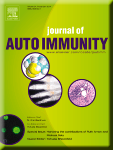Upholding the T cell immune-regulatory function of CD31 inhibits the formation of T/B immunological synapses in vitro and attenuates the development of experimental autoimmune arthritis in vivo
Clement M, Fornasa G, Loyau S, Morvan M, Andreata F, Guedj K, Khallou-Laschet J, Larghi P, Le Roux D, Bismuth G, Chiocchia G, Hivroz C, Newman DK, Nicoletti A, Caligiuri G
2014 • J Autoimmun • [pdf]
CD31, a trans-homophilic inhibitory receptor expressed on both T- and B-lymphocytes, drives the mutual detachment of interacting leukocytes. Intriguingly, T cell CD31 molecules relocate to the immunological synapse (IS), where the T and B cells establish a stable interaction. Here, we show that intact CD31 molecules, which are able to drive an inhibitory signal, are concentrated at the periphery of the IS but are excluded from the center of the IS. At this site, were the cells establish the closest contact, the CD31 molecules are cleaved, and most of the extracellular portion of the protein, including the trans-homophilic binding sites, is shed from the cell surface. T cells lacking CD31 trans-homophilic binding sites easily establish stable interactions with B cells; at the opposite, CD31 signaling agonists inhibit T/B IS formation as well as the ensuing helper T cell activation and function. Confocal microscopy and flow cytometry analysis of experimental T/B IS shows that the T cell inhibitory effects of CD31 agonists depend on SHP-2 signaling, which reduces the phosphorylation of ZAP70. The analysis of synovial tissue biopsies from patients affected by rheumatoid arthritis showed that T cell CD31 molecules are excluded from the center of the T/B cell synapses in vivo. Interestingly, the administration of CD31 agonists in vivo significantly attenuated the development of the clinical signs of collagen-induced arthritis in DBA1/J mice. Altogether, our data indicate that the T cell co-inhibitory receptor CD31 prevents the formation of functional T/B immunological synapses and that therapeutic strategies aimed at sustaining CD31 signaling will attenuate the development of autoimmune responses in vivo.


